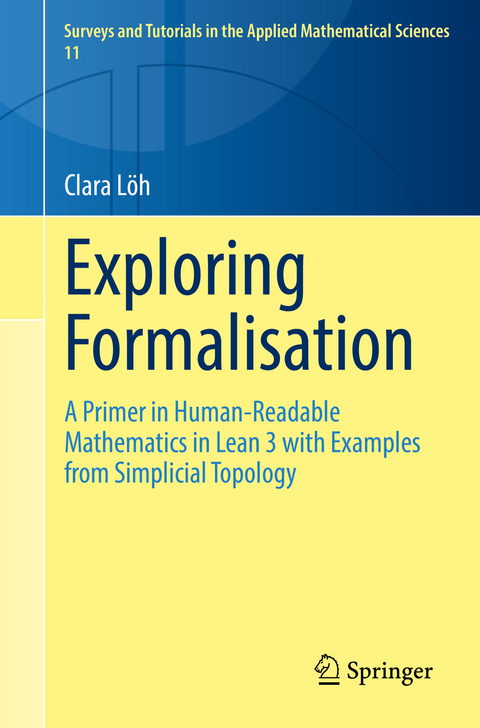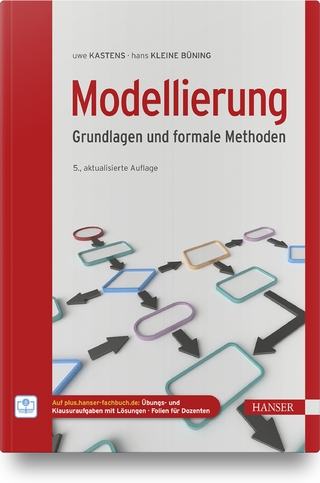
Exploring Formalisation
A Primer in Human-Readable Mathematics in Lean 3 with Examples from Simplicial Topology
Seiten
2022
|
1st ed. 2022
Springer International Publishing (Verlag)
978-3-031-14648-0 (ISBN)
Springer International Publishing (Verlag)
978-3-031-14648-0 (ISBN)
This primer on mathematics formalisation provides a rapid, hands-on introduction to proof verification in Lean.
After a quick introduction to Lean, the basic techniques of human-readable formalisation are introduced, illustrated by simple examples on maps, induction and real numbers. Subsequently, typical design options are discussed and brought to life through worked examples in the setting of simplicial complexes (a higher-dimensional generalisation of graph theory). Finally, the book demonstrates how current research in algebraic and geometric topology can be formalised by means of suitable abstraction layers.
Informed by the author's recent teaching and research experience, this book allows students and researchers to quickly get started with formalising and checking their proofs. The core material of the book is accessible to mathematics students with basic programming skills. For the final chapter, familiarity with elementarycategory theory and algebraic topology is recommended.
After a quick introduction to Lean, the basic techniques of human-readable formalisation are introduced, illustrated by simple examples on maps, induction and real numbers. Subsequently, typical design options are discussed and brought to life through worked examples in the setting of simplicial complexes (a higher-dimensional generalisation of graph theory). Finally, the book demonstrates how current research in algebraic and geometric topology can be formalised by means of suitable abstraction layers.
Informed by the author's recent teaching and research experience, this book allows students and researchers to quickly get started with formalising and checking their proofs. The core material of the book is accessible to mathematics students with basic programming skills. For the final chapter, familiarity with elementarycategory theory and algebraic topology is recommended.
Clara Loeh is Professor of Mathematics at the University of Regensburg, Germany. Her research focuses on simplicial volume and the interaction between geometric topology, geometric group theory, and measured group theory. This includes cohomological, geometric, and combinatorial methods. She is also interested in the foundations of mathematics and the formalisation/verification of mathematics in proof assistants.
Introduction.- 1 The Lean Proof Assistant.- 2 Basic Examples.- 3 Design Choices.- 4 Abstraction and Prototyping.
| Erscheinungsdatum | 27.09.2022 |
|---|---|
| Reihe/Serie | Surveys and Tutorials in the Applied Mathematical Sciences |
| Zusatzinfo | VI, 147 p. 1 illus. |
| Verlagsort | Cham |
| Sprache | englisch |
| Maße | 155 x 235 mm |
| Gewicht | 275 g |
| Themenwelt | Mathematik / Informatik ► Informatik ► Theorie / Studium |
| Mathematik / Informatik ► Mathematik ► Allgemeines / Lexika | |
| Mathematik / Informatik ► Mathematik ► Geometrie / Topologie | |
| Schlagworte | examples in Lean • formalization of mathematics • Lean • mathematics in Lean • Proof assistant • Simplicial Complexes • simplicial topology • theorem prover • tutorial on lean • verification of proofs |
| ISBN-10 | 3-031-14648-4 / 3031146484 |
| ISBN-13 | 978-3-031-14648-0 / 9783031146480 |
| Zustand | Neuware |
| Informationen gemäß Produktsicherheitsverordnung (GPSR) | |
| Haben Sie eine Frage zum Produkt? |
Mehr entdecken
aus dem Bereich
aus dem Bereich
Eine Einführung in die Systemtheorie
Buch | Softcover (2022)
UTB (Verlag)
25,00 €


